The traditional 9-to-5, chained to a desk with a four-year degree as the entry ticket, is rapidly becoming a relic. In today’s dynamic economy, skills, experience, and drive are the new currency. The rise of remote work has shattered geographical barriers, and a growing number of forward-thinking companies are realizing that talent isn’t confined to a college campus. This monumental shift opens up a world of opportunity for individuals with practical abilities but no formal degree.
If you’re ready to build a career on your terms, from anywhere, you’re in the right place. This guide is your roadmap to securing high-quality, flexible work based on what you can do, not where you went to school. Forget generic advice; we’re diving deep into the specifics.
This comprehensive listicle breaks down the best remote jobs without a degree, providing actionable insights for each role. You will learn:
- Detailed Job Descriptions: What the day-to-day work actually involves.
- Essential Skills: The specific, practical abilities employers are looking for.
- Average Salary Ranges: Realistic earning potential to help you set expectations.
- Career Pathways: How to grow and advance in each field without a diploma.
We’ve designed this resource to be a practical toolkit, not just a list. Our goal is to equip you with the knowledge and confidence to bypass the traditional degree requirement and land a fulfilling remote career. Your potential is limitless, and this guide will help you prove it. Let’s get started.
1. Virtual Assistant
Often called the Swiss Army knife of the remote world, a Virtual Assistant (VA) provides administrative, technical, or creative assistance to clients from a home office. This role is one of the most accessible and versatile remote jobs without a degree because it prioritizes practical skills, organization, and resourcefulness over formal education. It’s an ideal entry point into the digital workforce, offering a direct path to building a sustainable remote career.
The core of a VA’s work is to handle tasks that business owners or busy professionals don’t have the time to manage themselves. This can range from general administrative duties to highly specialized services. The sheer variety is what makes this role so appealing; you can carve out a niche that aligns perfectly with your existing skills and interests.
What You’ll Do and Key Skills
A VA’s day-to-day responsibilities are incredibly diverse and depend on their clients’ needs. However, most roles revolve around a core set of skills.
Common Responsibilities:
- Administrative Support: Managing calendars, scheduling appointments, handling email inboxes, and organizing digital files.
- Customer Service: Responding to customer inquiries via email, chat, or phone.
- Content & Social Media: Creating social media posts, scheduling content, managing engagement, and performing basic graphic design.
- Technical Tasks: Handling data entry, conducting online research, and managing basic website updates (e.g., on WordPress).
To succeed, you’ll need a strong foundation in soft skills like communication, time management, and problem-solving. Tech-savviness is also crucial, with proficiency in tools like Google Workspace, Microsoft Office, Slack, and project management software like Trello or Asana being highly valued.
Specializing and Earning Potential
While general administrative VAs are always in demand, specializing can significantly increase your earning potential. For example, if you have a knack for visual platforms and marketing, a role as a Pinterest Virtual Assistant could leverage your organizational and creative skills for clients looking to boost their online presence.
Other profitable specializations include:
- Bookkeeping & Finance: Managing invoices, tracking expenses, and basic accounting.
- Email Marketing: Creating newsletters and managing subscriber lists on platforms like Mailchimp.
- Podcast Management: Editing audio, writing show notes, and promoting episodes.
The salary for a Virtual Assistant can vary widely based on experience and specialization. Entry-level VAs typically start around $15-$25 per hour, while experienced specialists can command $50-$75 per hour or more. As you build your portfolio and gather client testimonials, your rates can grow substantially. If you’re looking for opportunities in this field, you can learn more about how the VA role fits into the landscape of entry-level remote jobs without a degree.
2. Indeed
As one of the world’s largest job search engines, Indeed is a powerhouse for finding remote work, especially for roles that don’t hinge on a traditional degree. Its massive database and powerful search filters make it an essential tool for anyone seeking entry into the remote workforce. The platform’s commitment to skills-first hiring is increasingly reflected in its listings, making it a prime destination to find the best remote jobs without a degree.
Indeed excels by aggregating millions of job postings from company career pages, staffing agencies, and other job boards into a single, searchable interface. For remote job seekers, this means unparalleled access to opportunities across a vast spectrum of industries, from customer service and data entry to more specialized roles in tech and creative fields. Its intuitive design simplifies the process of finding and applying for positions that match your skills and experience.
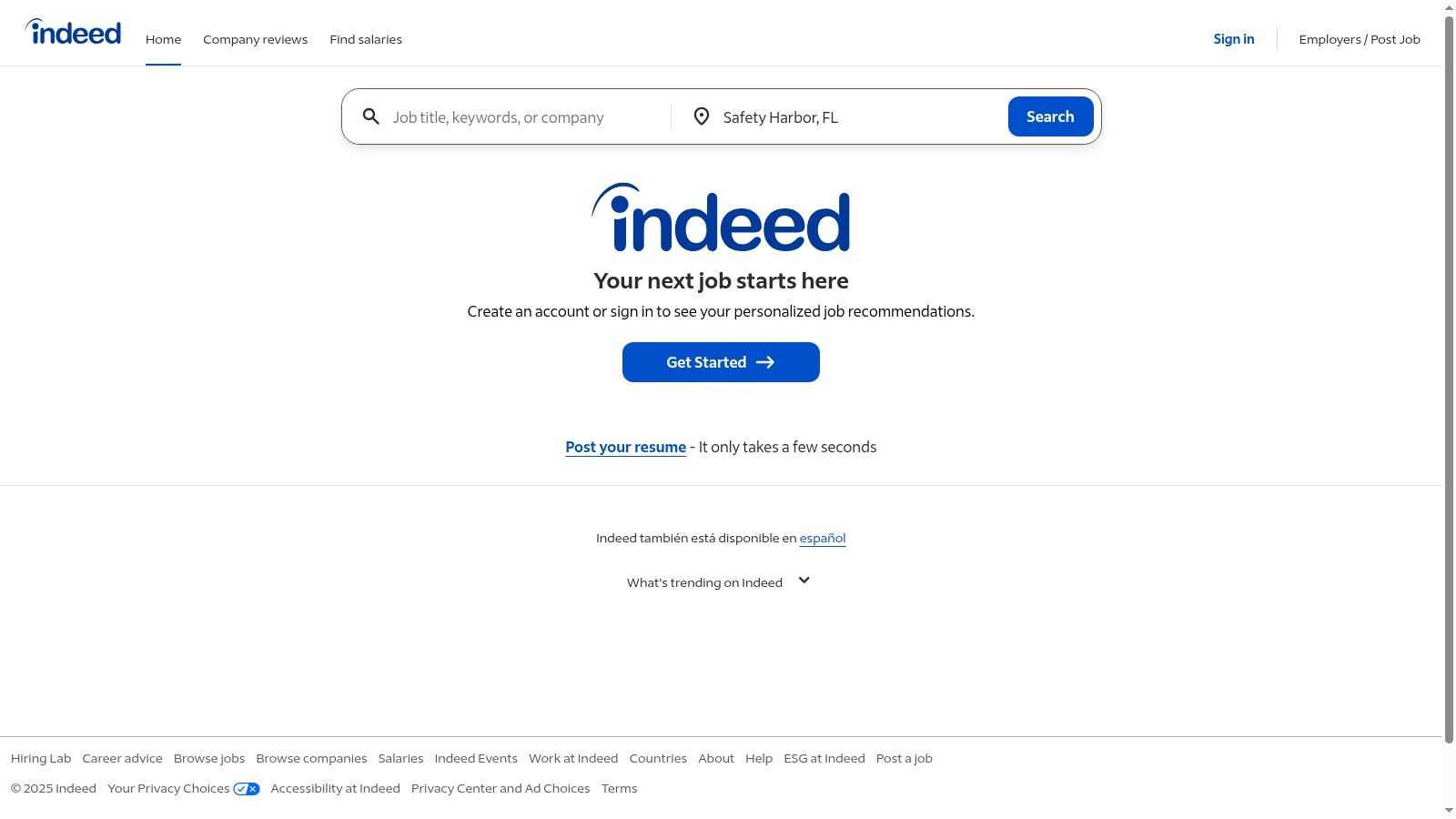
What You’ll Do and Key Features
Navigating Indeed is straightforward, but using its features strategically is key to uncovering the best opportunities. The platform is free for job seekers and designed to streamline your search from start to finish.
Common Features & How to Use Them:
- Advanced Search Filters: Use the “Remote” filter and combine it with keywords like “entry-level,” “no degree,” or “no experience” to narrow down results. You can also filter by salary estimate and job type (full-time, part-time, contract).
- Job Alerts: Set up email alerts for specific searches. This automates your job hunt by sending relevant new postings directly to your inbox, ensuring you’re among the first to apply.
- Company Reviews: Research potential employers by reading reviews from current and former employees. This provides valuable insight into company culture, management, and work-life balance.
- Easy Apply: Many listings feature an “Apply Now” or “Easily Apply” button, allowing you to submit your resume and a pre-saved cover letter with just a few clicks.
To succeed on the platform, maintain an updated and professional resume. Tailor your application for each role, highlighting the specific skills mentioned in the job description.
Pros, Cons, and Earning Potential
While Indeed offers an enormous inventory, its size comes with both advantages and disadvantages. The sheer volume of listings is a major pro, providing endless possibilities. However, this also means you’ll face high competition for popular remote roles, and you may occasionally encounter outdated or duplicate postings.
Key Pros:
- Massive Selection: Unrivaled access to job listings across nearly every industry.
- Powerful Search Tools: Excellent filtering options help you pinpoint relevant roles quickly.
- Completely Free: No cost for job seekers to search, create a profile, or apply.
Key Cons:
- High Competition: Popular remote jobs can receive hundreds of applications.
- Listing Quality: The vast database may include some stale or low-quality postings.
Earning potential on Indeed varies as widely as the jobs it lists. You can find entry-level remote jobs starting around $15-$20 per hour for roles like customer service or data entry. As you explore more specialized opportunities that value skills over formal education, such as in sales or project coordination, you can find positions offering $50,000 or more annually. If you’re looking for guidance, you can explore the variety of entry-level remote jobs without a degree available on platforms like this.
3. LinkedIn Jobs
LinkedIn Jobs transcends the traditional job board by integrating a powerful job search engine with the world’s largest professional network. This combination makes it a standout platform for finding remote jobs without a degree, as it allows you to showcase your skills, projects, and certifications directly to recruiters. Instead of just submitting a resume, you build a comprehensive professional profile that tells your whole story.
The platform’s strength lies in its “skills-first” approach. Hiring managers on LinkedIn often search for candidates based on specific skills rather than just formal education history. This shifts the focus to what you can do, not where you went to school, creating a more level playing field for self-taught professionals and those with non-traditional career paths. Its built-in networking tools also give you a direct line to hiring managers and team members at companies you admire.
What You’ll Do and Key Features
LinkedIn is more than a place to apply for jobs; it’s a tool for active career management. The platform is designed to help you get discovered by the right people.
Key Platform Features:
- Advanced Remote Filtering: Easily search for jobs that are fully remote, hybrid, or on-site, and save your searches for new job alerts.
- “Easy Apply” Functionality: Submit your LinkedIn profile as your application for certain jobs with just one click, streamlining the process.
- Skills & Endorsements: Add relevant skills to your profile and get them endorsed by your connections to validate your expertise.
- Networking Capabilities: Connect directly with recruiters, hiring managers, and employees at target companies to ask questions and build relationships.
To succeed on LinkedIn, you need to treat your profile like a dynamic resume. Keep it updated with new projects, skills, and certifications. Engage with industry content, join relevant groups, and actively grow your network.
Specializing and Finding Opportunities
While LinkedIn is a generalist platform, its powerful search and filtering tools help you find specialized remote roles that don’t require a degree. For example, a search for “Remote Digital Marketing Assistant” will yield numerous entry-level positions where practical skills are paramount. A key responsibility in such a role is mastering how to create social media content that truly engages and converts your audience.
Other in-demand roles you can find include:
- Sales Development Representative (SDR): Focused on lead generation and outreach.
- Customer Support Specialist: Providing help to customers via email, chat, or phone.
- Data Entry Clerk: Inputting and managing information for businesses.
The platform’s transparency is another major advantage. You can often see who posted a job, how many people have applied, and what skills the top applicants have. While a basic account is free and highly effective, LinkedIn Premium (around $39.99/month) offers additional features like InMail credits to message non-connections and deeper insights into job postings. This makes it one of the best remote job websites for a comprehensive and strategic job search.
4. We Work Remotely (WWR)
As one of the original and largest remote-only job boards, We Work Remotely (WWR) is a foundational resource for anyone serious about landing a remote role. Its core strength is its strict focus: every single listing is for a position that can be performed from anywhere. This targeted approach eliminates the noise of hybrid or location-specific jobs, making it an incredibly efficient platform for finding the best remote jobs without a degree.
WWR is not just a job board but a community hub that has been connecting talented professionals with forward-thinking companies for over a decade. The platform is designed for clarity and ease of use, allowing you to quickly filter through categories and find roles that match your skill set, even if you don’t have a college diploma.
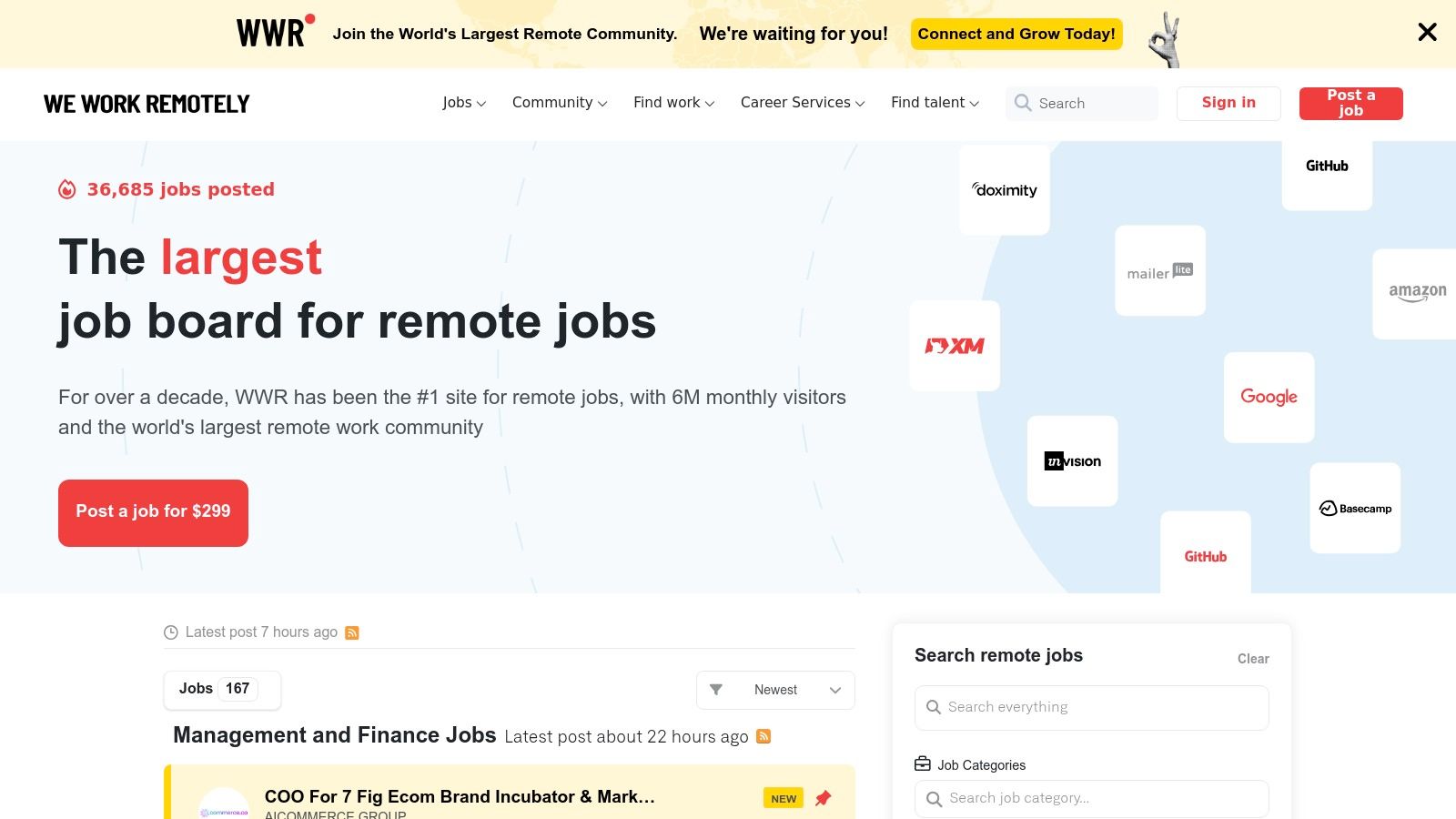
What You’ll Find and How to Use It
The platform’s simple interface makes job searching straightforward. It is completely free for job seekers to browse and apply, with no account required to view listings. This accessibility is a major advantage for those just starting their search.
Key Features and Offerings:
- Diverse Categories: While strong in tech, WWR features a wide array of categories, including Customer Support, Marketing, Design, and Management, which often contain degree-free opportunities.
- Job Alerts: You can subscribe to daily or weekly email alerts for specific categories, ensuring you never miss a new opportunity that fits your criteria.
- Clear Job Postings: Listings typically provide transparent salary ranges and clear expectations, helping you assess fit without wasting time.
- Community Resources: WWR also hosts a Slack community and virtual events, offering valuable networking and learning opportunities beyond the job board itself.
To use the platform effectively, focus on the Customer Support and Marketing & Sales sections. These areas are rich with entry-level and mid-level roles where employers prioritize hands-on skills, experience, and strong communication abilities over formal education.
Pros, Cons, and Getting Started
We Work Remotely stands out for its commitment to a 100% remote ethos. This dedicated focus is its greatest asset, ensuring every job you see is genuinely location-independent. However, it’s important to be aware of its limitations.
Pros:
- Exclusively Remote: Saves time by filtering out all on-site and hybrid roles.
- High-Quality Listings: Companies pay a premium to post, which often results in more serious and well-vetted opportunities.
- Free for Job Seekers: No fees or subscriptions are required to browse and apply.
Cons:
- Geographic Restrictions: Some companies, particularly those based in the US, may specify that they can only hire from certain states or countries.
- Tech-Leaning: While diverse, the platform still has a strong emphasis on tech and startup roles, which might not suit everyone.
To get started, visit weworkremotely.com and begin browsing by category. Set up job alerts for relevant fields and tailor your resume to highlight practical skills and accomplishments that align with the specific roles you find.
5. Remotive
Remotive stands out as a highly curated job board designed to cut through the noise of massive aggregators. It’s not just another job site; it’s a community-driven platform focused on quality over quantity, making it an excellent resource for finding legitimate remote jobs without a degree. The platform emphasizes transparency and direct connections, ensuring that job seekers are applying to real roles at reputable companies.
The core philosophy behind Remotive is to simplify the remote job search. Unlike overwhelming platforms that list tens of thousands of jobs, Remotive’s team hand-screens listings to filter out scams, low-quality offers, and location-restricted roles disguised as “remote.” This curation saves you valuable time and energy, allowing you to focus on applications that matter.
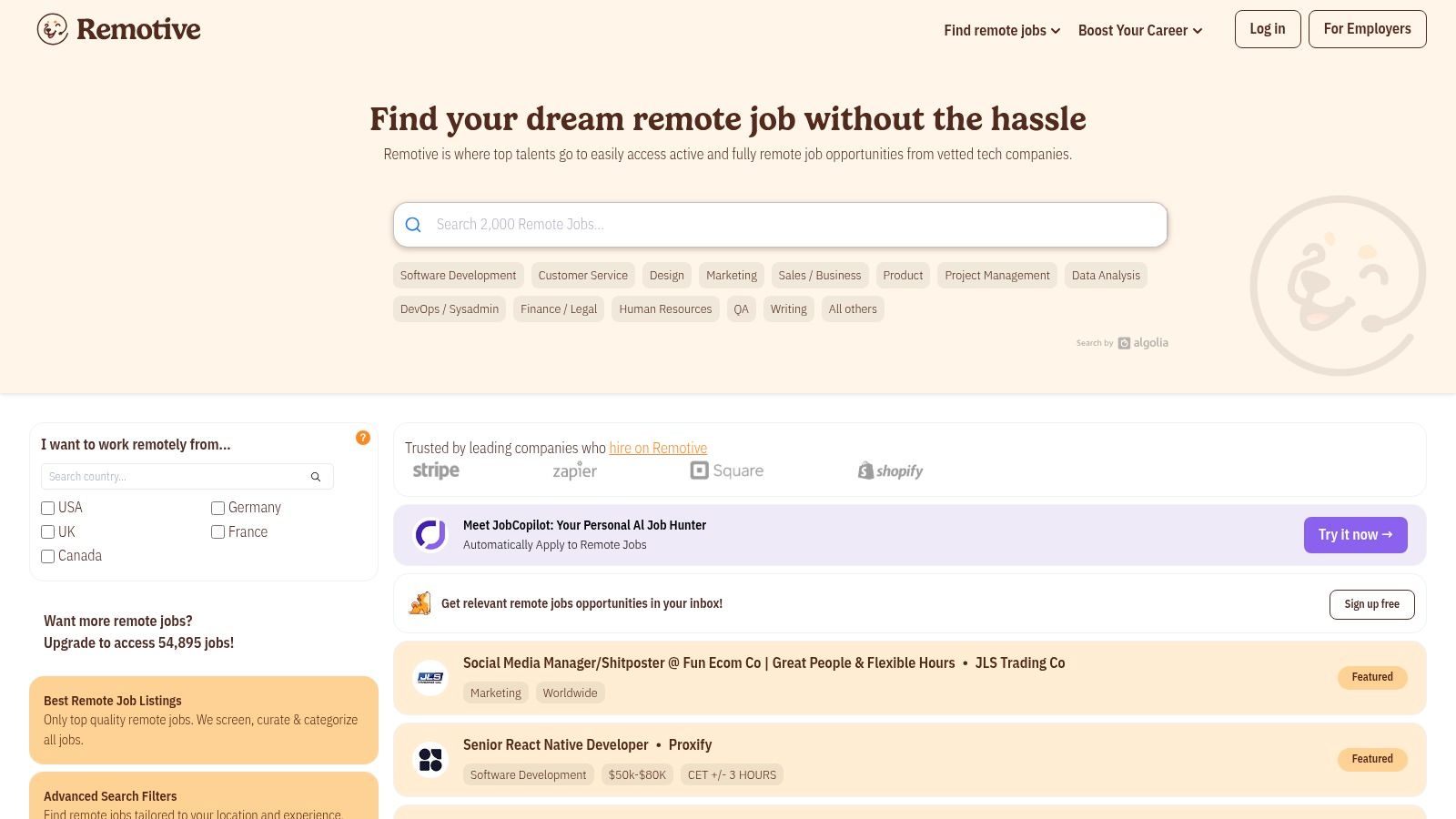
What You’ll Do and Key Features
Remotive offers a clean, user-friendly interface that makes finding relevant positions straightforward. The platform is designed for efficiency, prioritizing ease of use and direct access to opportunities.
Key Features:
- Strong Curation: Every job is vetted, which means a higher signal-to-noise ratio and fewer spam or misleading postings.
- Simple Filtering: Easily sort jobs by categories like Marketing, Sales, Engineering, and Customer Support to find roles that match your skills.
- Direct Application Process: Remotive links you directly to the employer’s application page, creating a transparent and straightforward experience. There’s no need to create an account to browse or apply.
- Helpful Content: The site includes a blog with valuable tips and insights for remote job seekers, helping you navigate the hiring process.
To get the most out of Remotive, you should check the listings daily and set up email alerts for your preferred job categories. Its curated nature means new, high-quality roles appear frequently but can also get filled quickly.
Finding Degree-Free Roles and Earning Potential
While Remotive lists jobs across all experience levels, its focus on tech-adjacent roles in areas like customer support, sales, and marketing makes it a goldmine for positions where skills are valued more than degrees. Many of these roles are ideal for those seeking the best remote jobs without a degree, as they prioritize practical experience and provable skills.
To effectively find these roles on Remotive:
- Focus on Skill-Based Categories: Concentrate on “Customer Support,” “Sales,” and “Marketing” sections.
- Read Descriptions Carefully: Look for job descriptions that emphasize experience with specific tools (like Salesforce or HubSpot) or skills (like content writing or community management) over educational requirements.
- Leverage the “Worldwide” Filter: This helps you find genuinely global opportunities that don’t have hidden location requirements.
The salary for positions found on Remotive varies by role and company. Entry-level customer support roles might start around $35,000-$50,000 annually, while experienced sales development representatives or marketing coordinators can earn $50,000-$70,000 or more, plus commissions or bonuses. The platform’s high-quality listings often come from well-funded startups and established tech companies that offer competitive compensation. To see how these roles fit into the broader job market, explore more about remote work-from-home jobs that don’t require a degree.
6. Upwork
As one of the world’s largest and most established freelance marketplaces, Upwork serves as a massive digital hub connecting skilled professionals with clients seeking their services. It’s an indispensable resource for anyone looking for the best remote jobs without a degree because it operates on a simple, powerful principle: your proven skills and portfolio matter far more than your formal education. Upwork provides a direct route to monetizing your abilities in fields like writing, design, customer support, and administrative assistance.
The platform is designed to be a complete ecosystem for freelancers. It facilitates everything from job discovery and proposal submission to communication, time tracking, and secure payments. This integrated environment allows you to build a professional reputation from scratch, with each completed project and positive review adding to your credibility and making it easier to land higher-paying work in the future.
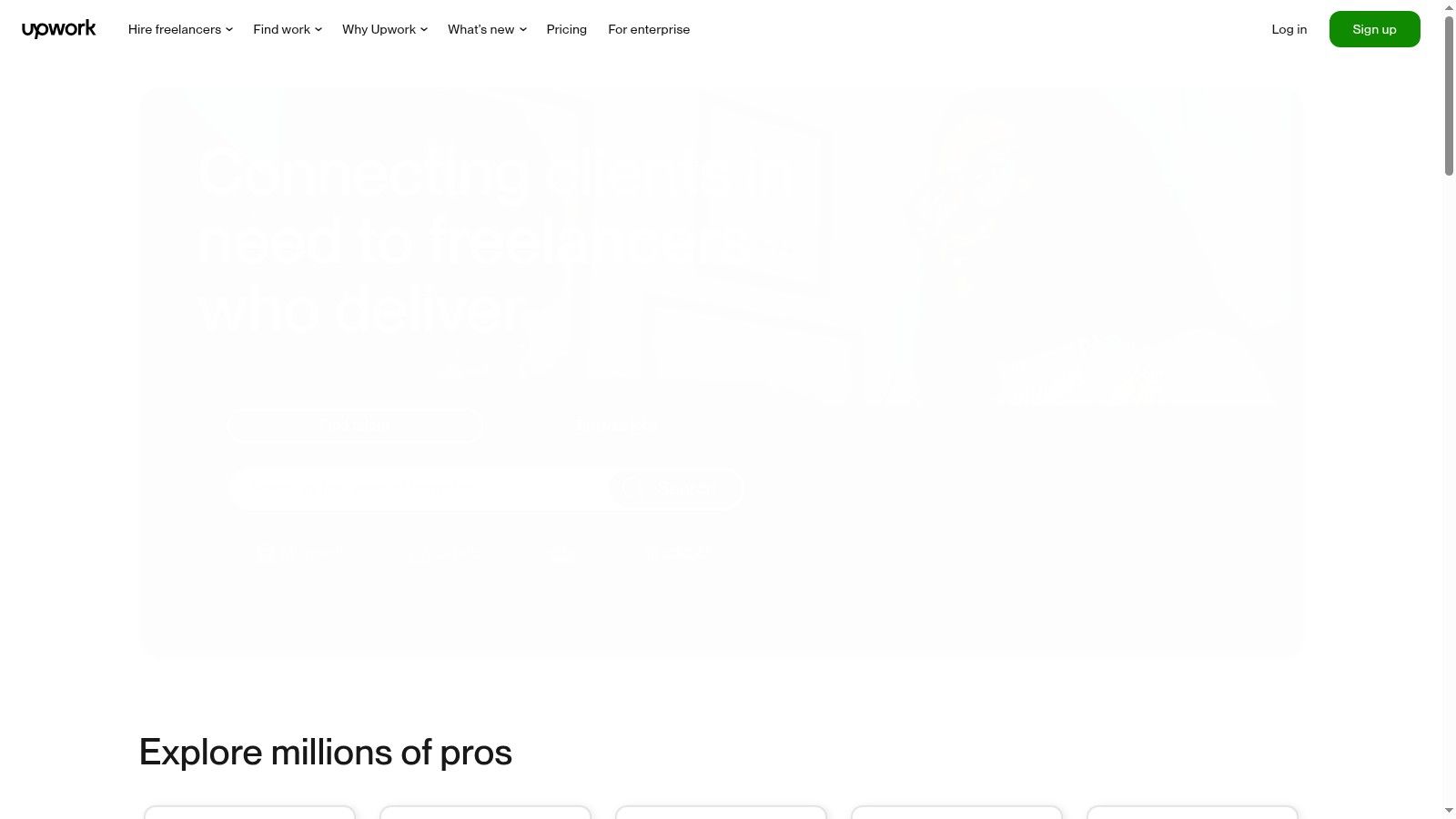
What You’ll Do and Key Skills
On Upwork, you aren’t hired for a permanent “job” but rather for specific projects, which can be short-term, long-term, hourly, or fixed-price. This flexibility allows you to find work that fits your schedule and skill set.
Common Remote Opportunities:
- Admin & Customer Support: Providing virtual assistance, handling data entry, and managing customer service inquiries.
- Writing & Translation: Crafting blog posts, website copy, and translating documents.
- Design & Creative: Creating logos, social media graphics, and website mockups.
- Sales & Marketing: Generating leads, managing social media accounts, and performing SEO tasks.
To stand out, you need a compelling profile that showcases your skills, a strong portfolio with examples of your best work, and the ability to write persuasive proposals. Soft skills like proactive communication, reliability, and negotiation are just as critical as your technical expertise for building lasting client relationships.
Platform Structure and Earning Potential
Upwork’s structure is built to help freelancers grow, but it’s important to understand how it works. You bid on projects using “Connects,” which are digital tokens. While you get some for free each month, you may need to purchase more to apply for a sufficient number of jobs.
Key platform features include:
- Payment Protection: Escrow services for fixed-price projects and a Work Diary for hourly contracts ensure you get paid for your work.
- Transparent Service Fees: Fees start at 20% for the first $500 billed with a client and decrease as you earn more with that same client.
- Reputation System: A Job Success Score and client reviews build your credibility over time.
Earnings on Upwork can range dramatically. Newcomers might start with smaller projects at $10-$20 per hour to build their portfolio. As you gain positive reviews and specialize in a high-demand niche, it’s common for experienced freelancers to earn $50-$100 per hour or more. Your ability to market yourself effectively is key. For more strategies on leveraging platforms like this, you can learn more about how to find a remote job effectively.
7. NoDegree
NoDegree is more than just a job board; it’s a mission-driven platform dedicated to connecting skilled professionals who don’t have a college degree with companies that value hands-on experience and practical abilities. This platform directly addresses a major hurdle for many job seekers by creating a space where a degree is not a prerequisite. For anyone searching for the best remote jobs without a degree, NoDegree filters out the noise and focuses exclusively on relevant, accessible opportunities.
The platform was built on the belief that talent, skills, and ambition are not defined by a diploma. It champions a skills-first hiring approach, making it an invaluable resource for self-taught professionals, bootcamp graduates, and anyone with a non-traditional career path. Beyond job listings, NoDegree fosters a community through its podcast and educational content, sharing success stories that inspire and guide its users.
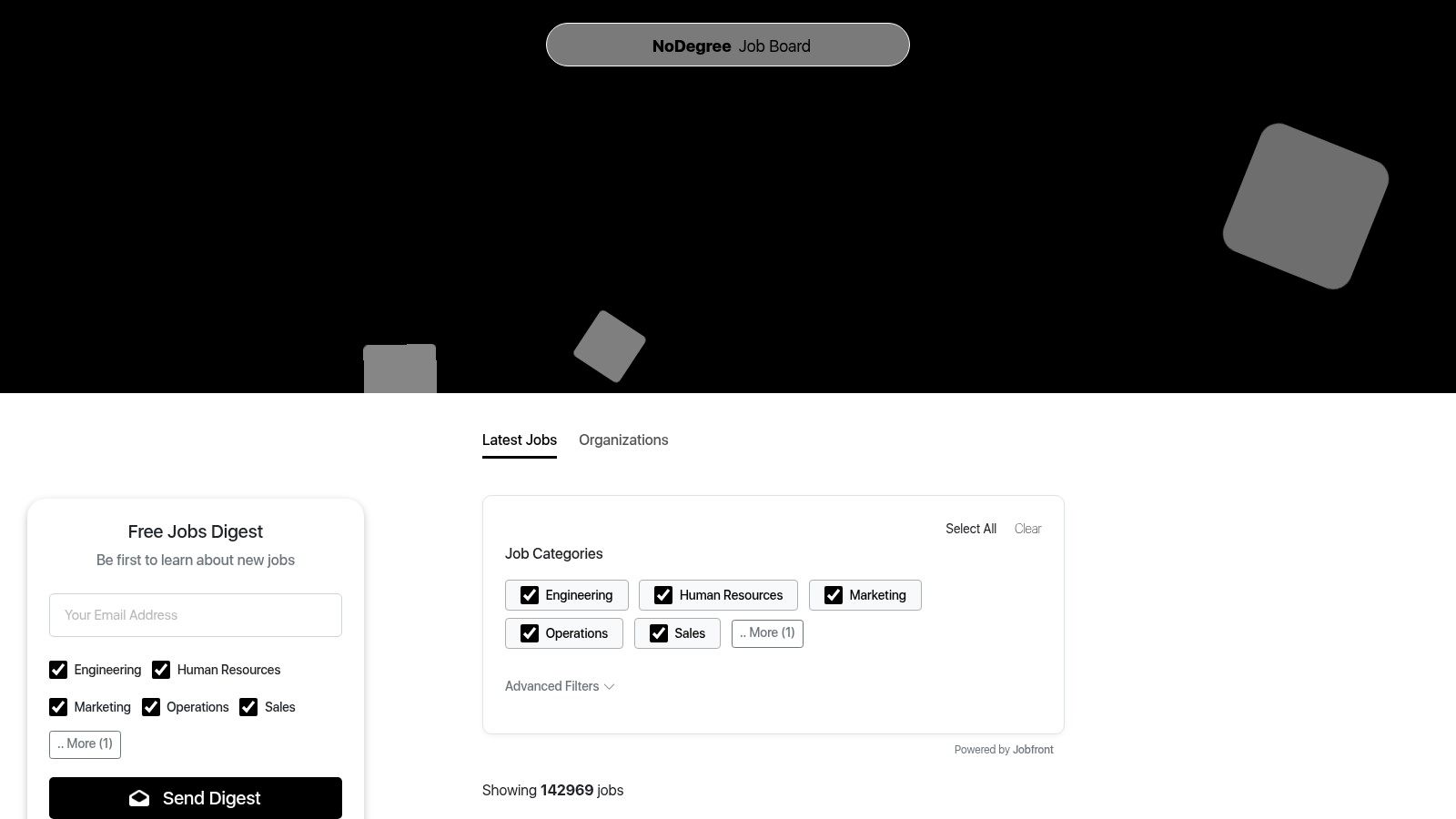
Key Features and How to Use It
NoDegree simplifies the job search by curating roles where a degree is explicitly not required. The platform is straightforward and designed for a targeted, efficient experience.
Platform Highlights:
- Dedicated “Remote” Filter: Easily find work-from-home positions across various industries like customer support, operations, sales, and marketing.
- Skills-First Job Descriptions: Companies posting on NoDegree are already aligned with hiring based on practical skills, so you can apply with confidence.
- Educational Podcast: The NoDegree Podcast features interviews with successful professionals who have built amazing careers without a degree, offering actionable advice and motivation.
- Community and Content: The platform provides articles and a newsletter that highlight new roles and share career development tips tailored to its audience.
To use the platform effectively, start by navigating to the NoDegree job board and immediately applying the “Remote” filter. Since the entire site is degree-free, you can focus your energy on finding roles that match your skills and interests. Sign up for their newsletter to get curated job alerts sent directly to your inbox.
Pros, Cons, and Getting Hired
NoDegree’s biggest advantage is its hyper-focused niche. You won’t waste time sifting through listings that have “bachelor’s degree required” buried in the fine print. It’s completely free for job seekers to browse and apply for positions, as you are typically redirected to the employer’s career page.
Pros:
- Highly Targeted: Every job listed is open to candidates without a degree.
- Supportive Community: The podcast and content create an encouraging ecosystem.
- Free to Use: No cost for job seekers to access listings and apply.
Cons:
- Smaller Job Inventory: As a niche platform, it has fewer listings than massive job boards like Indeed or LinkedIn.
- Occasional Outdated Links: Some listings may not be removed immediately after they are filled.
To stand out, tailor your resume to highlight your skills, projects, and quantifiable achievements. Since employers on NoDegree prioritize practical experience, a strong portfolio or a detailed list of accomplishments will be far more impactful than a traditional education section. Listen to the podcast for insights into what like-minded companies are looking for in candidates.
Top 7 Remote Job Platforms Comparison
| Platform | Implementation Complexity 🔄 | Resource Requirements ⚡ | Expected Outcomes 📊 | Ideal Use Cases 💡 | Key Advantages ⭐ |
|---|---|---|---|---|---|
| FlexJobs | Medium - paid subscription and vetting | Moderate - subscription fees | High-quality, scam-free remote/flexible job listings | Remote, hybrid, freelance roles w/o degree | Human-vetted listings, low spam, career tools |
| Indeed | Low - free and easy to use | Low - free to search and apply | Large volume with varied job types and education levels | Broad job search with high competition | Huge selection, robust filters, no subscription fee |
| LinkedIn Jobs | Medium - job search + networking features | Moderate - optional premium | Network-driven opportunities emphasizing skills | Professional networking plus job search | Combine job search with networking, easy apply |
| We Work Remotely | Low - remote-only job board, simple UI | Low - free access | Focused 100% remote jobs with steady updates | Remote-only jobs seekers | Remote-only, active job fairs, free access |
| Remotive | Low - curated remote board, simple filters | Low - free to browse/apply | Quality remote jobs with less noise | Quality-focused remote job seekers | Strong curation, scam avoidance, straightforward apps |
| Upwork | High - freelance marketplace with tools | Moderate - fee-based services | Fast freelance gigs based on skills, pay via platform | Freelancers seeking flexible paid projects | Portfolio/reviews build credibility, payment protection |
| NoDegree | Low - niche site, community features | Low - free to browse/apply | Remote jobs specifically for non-degree candidates | Non-degree career paths seekers | Niche focus, educational content, free access |
Your Next Step: From Plan to Paycheck
The journey through the landscape of remote work has revealed a powerful truth: a college degree is no longer the sole gatekeeper to a successful and fulfilling career. As we’ve explored, the demand for skill-based talent is surging, creating incredible opportunities for individuals who can demonstrate practical expertise and a strong work ethic. From the specialized platforms like We Work Remotely and Remotive to the expansive databases of Indeed and LinkedIn, the tools to find these roles are more accessible than ever.
The key takeaway is a fundamental shift in mindset. Instead of focusing on a perceived educational gap, you must pivot to highlighting your tangible skills, project experience, and a proactive attitude. The best remote jobs without a degree are awarded to candidates who prove they can deliver results, not just list credentials. Your portfolio, your self-directed learning, and your ability to articulate your value are your new currency.
Crafting Your Action Plan
Transitioning from aspiration to application requires a clear, strategic plan. Generic applications sent en masse will rarely yield results. Instead, focus on a methodical approach that builds momentum and showcases your unique qualifications.
- Step 1: Identify Your Niche. Review the roles discussed in this article. Which one genuinely excites you? Is it the creative problem-solving of a UX Designer, the meticulous organization of a Virtual Assistant, or the detail-oriented work of a QA Tester? Choose one or two roles to focus your energy on initially.
- Step 2: Bridge the Skill Gap. Once you have a target role, perform a self-audit. What skills do you already possess, and which ones do you need to develop? Use free resources like Coursera, HubSpot Academy, or even YouTube tutorials to build foundational knowledge.
- Step 3: Build Your Proof of Work. A resume is a claim; a portfolio is proof. Create small, tangible projects that demonstrate your abilities. If you’re an aspiring social media manager, create a mock content calendar for a favorite brand. If you’re aiming for a data entry role, create a complex spreadsheet showcasing your proficiency. These projects are your most powerful assets.
Selecting the Right Platform for Your Search
With your skills sharpened and portfolio ready, choosing the right job board is crucial. Each platform serves a slightly different purpose, and using them strategically will maximize your chances of success.
- For Beginners and Broad Searches: Start with Indeed and LinkedIn Jobs. Their vast networks and powerful filters can help you understand the market and find a wide range of entry-level positions.
- For Niche and Tech-Focused Roles: Platforms like We Work Remotely and Remotive are curated for a tech-savvy audience. The quality of listings is often higher, but the competition can be fiercer.
- For Freelance and Project-Based Work: If you prefer the flexibility of freelancing, Upwork is an excellent starting point. It allows you to build a reputation and portfolio one project at a time.
- For Degree-Free Focused Opportunities: NoDegree is specifically designed for candidates like you. It filters out the noise and connects you directly with employers who value skills over formal education.
As your remote career advances, you might consider opportunities in freelancing or contracting. Exploring resources that detail the financial and administrative aspects for roles like contracting for QA professionals can be incredibly valuable as you gain more autonomy and take on more complex projects.
Ultimately, the path to securing one of the best remote jobs without a degree is an active one. It requires initiative, continuous learning, and strategic positioning. The opportunities are real, and the demand for skilled, driven individuals is only growing. You have the tools and the roadmap; now is the time to take that first decisive step.
Ready to find companies that value your skills over your diploma? Remote First Jobs curates the best remote opportunities from employers who prioritize talent and experience. Stop filtering through jobs that require a degree and start your targeted search today on Remote First Jobs.






